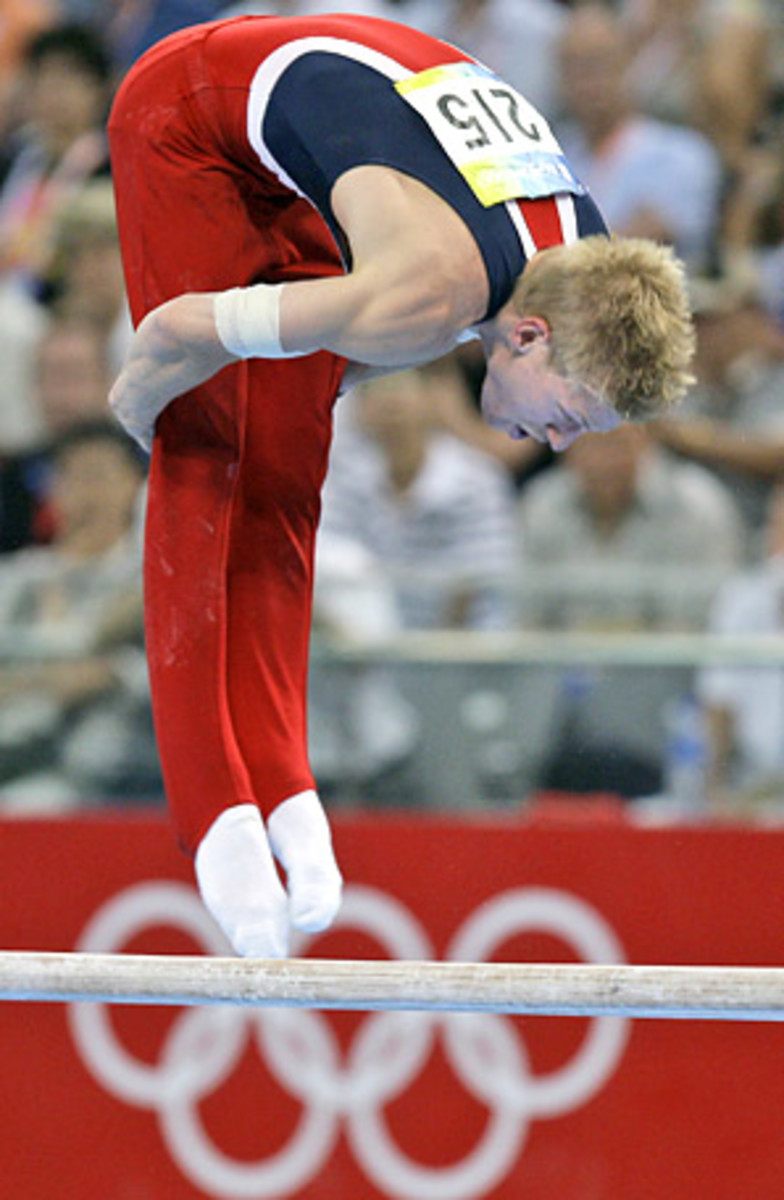
U.S. men celebrate the bronze age
The bronze captured by the U.S. men's gymnastics team on Tuesday morning -- Monday night for those viewing back home -- was as satisfying a medal, regardless of color, as any that will be taken home from these Games.
There was never a question of winning gold. That medal, as expected, went to a dominant Chinese team, which finished first in five of the six apparatuses and easily outdistanced the silver medalists, Japan, by 10.275 points -- an immense margin. Silver was actually a possibility for the Americans, who led the Japanese by 1.70 points after five rotations. Unfortunately, the one remaining rotation was the pommel horse, the weakest event for the U.S. The Japanese, the defending Olympic champions, were finishing on the high bar, and outscored the U.S. by 4.95 points in the final rotation to easily earn the silver. But the U.S. held on to third-place over Germany thanks to a brilliant pommel horse routine by Alexander Artemev, who scored 15.35 in his first and only event of the day. "I wanted to prove to these guys that I'm a clutch performer," said Artemev, the bronze medal hanging from his neck.
Said Justin Spring, "The kid's a soldier. He had one event, and he took care of business. We had a lot of curveballs thrown at this team, but we just rolled with them and never stopped believing in ourselves."
This team had more obstacles strewn in its path than a boot camp marine. First, it lost its superstar, Paul Hamm, who stepped down with an injury. Then, the Americans lost their veteran leader, Morgan Hamm, Paul's twin, whose injured ankle kept him from competing in his third Olympics. Alternate Raj Bhavsar, who nearly quit the sport after being an alternate on the 2004 Olympic team, and again after failing to make the 2007 World team, was named to replace Paul Hamm. A second alternate, Artemev, was named to fill in for Morgan. It was a team operating on half its cylinders before the first tumbling pass.
They were largely written off by the American press. They were competing deep in the shadows of the U.S. women's team. And in the preliminary phase of the competition, they finished a marginally disappointing sixth. But the preliminary totals were not carried forward, and in the finals, only three athletes competed in each apparatus. All three scores counted. To get on the podium, the first order of business was to avoid any big mistakes.
Bhavsar was first up on the first event, rings, and his 15.325 got them off to a solid start. "It was an incredible feeling to just let go and let my gymnastics take over," Bhavsar said. Jonathan Horton, who had a terrific night sticking the landings on all five of his rotations, followed with a 15.625. Kevin Tan, a rings specialist, added a 15.425. Suddenly, the U.S. was off and running. Meanwhile, the Russians, Germans, and South Koreans, who were expected to be their chief rivals for the bronze, all had bobbles in their first rotations, giving the underdog U.S. team early momentum. "Raj got us going big time with a solid performance on rings, and away we went," said coach Kevin Mazeika. "It's been a roller-coaster ride, and I couldn't be prouder of the guys."
Vault and parallel bars were both solid events for the U.S., but their fourth rotation was the high-risk, high-reward high bar. Here, they put up the points that eventually won the bronze, finishing second only to the Chinese in the bar. Joey Hagerty got it started with a solid 15.55 routine, and that was followed by two hair-raising, fingertip-grabbing, high-flying circus shows by Horton and Spring. Both nailed their dismounts as solidly as if two sacks of cement had been dropped from the rafters to the mat. Horton scored 15.70 and Spring a 15.675, the fourth- and fifth-highest scores posted all day on that apparatus. "We rocked it," said Spring.
Suddenly, the Americans had a 3.375-point lead over Japan with just two rotations remaining: floor and pommel horse. The Japanese cut that margin in half before the final rotation, and when Tan scored just 12.775 as the first man up on pommel horse, the U.S. abandoned any hope of the silver medal and could feel Germany breathing down its necks for the bronze.
Bhavsar scored just a point higher, 13.75, so when it came Artemev's turn, everyone on the team knew that to win a medal, he had to stay on the horse. Yet his routine is a high-risk, high-kicking one, and he'd fallen off it twice during Olympic trials. But none of his teammates doubted Artemev for a moment. "He tends to be better when he swings big, so that's all I told him," said Bhavsar. "Ever since joining us in Beijing, he'd pretty much boned every pommel horse set he'd raised his hand for."
Artemev did it again, bringing the pro-Chinese crowd to a roar as he scissor-kicked his way to a high-energy finish.
"Sasha told me afterward he was shaking the whole time during that routine," said Horton. "But you'd never have known it from watching him. What you don't see is we're all shaking out there; we're all nervous. But under those conditions the great athletes still perform."
And that, in the final analysis, is what this U.S. men's gymnastics team proved: They were great athletes who could perform under pressure. No, they didn't have a superstar. No, they didn't have a bandwagon. No, they didn't have much in the way of fame or endorsements.
But they had themselves. And they had belief. And now they've got the shiniest bronze medal you can imagine.




